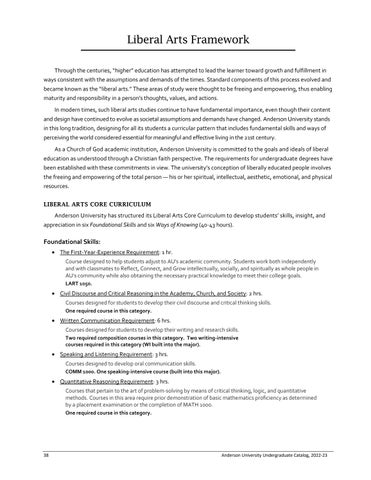Liberal Arts Framework Through the centuries, “higher” education has attempted to lead the learner toward growth and fulfillment in ways consistent with the assumptions and demands of the times. Standard components of this process evolved and became known as the “liberal arts.” These areas of study were thought to be freeing and empowering, thus enabling maturity and responsibility in a person’s thoughts, values, and actions. In modern times, such liberal arts studies continue to have fundamental importance, even though their content and design have continued to evolve as societal assumptions and demands have changed. Anderson University stands in this long tradition, designing for all its students a curricular pattern that includes fundamental skills and ways of perceiving the world considered essential for meaningful and effective living in the 21st century. As a Church of God academic institution, Anderson University is committed to the goals and ideals of liberal education as understood through a Christian faith perspective. The requirements for undergraduate degrees have been established with these commitments in view. The university’s conception of liberally educated people involves the freeing and empowering of the total person — his or her spiritual, intellectual, aesthetic, emotional, and physical resources. LIBERAL ARTS CORE CURRICULUM
Anderson University has structured its Liberal Arts Core Curriculum to develop students’ skills, insight, and appreciation in six Foundational Skills and six Ways of Knowing (40-43 hours).
Foundational Skills: • The First-Year-Experience Requirement: 1 hr. Course designed to help students adjust to AU’s academic community. Students work both independently and with classmates to Reflect, Connect, and Grow intellectually, socially, and spiritually as whole people in AU’s community while also obtaining the necessary practical knowledge to meet their college goals. LART 1050.
• Civil Discourse and Critical Reasoning in the Academy, Church, and Society: 2 hrs. Courses designed for students to develop their civil discourse and critical thinking skills. One required course in this category.
• Written Communication Requirement: 6 hrs. Courses designed for students to develop their writing and research skills. Two required composition courses in this category. Two writing-intensive courses required in this category (WI built into the major).
• Speaking and Listening Requirement: 3 hrs. Courses designed to develop oral communication skills. COMM 1000. One speaking-intensive course (built into this major).
• Quantitative Reasoning Requirement: 3 hrs. Courses that pertain to the art of problem-solving by means of critical thinking, logic, and quantitative methods. Courses in this area require prior demonstration of basic mathematics proficiency as determined by a placement examination or the completion of MATH 1000. One required course in this category.
38
Anderson University Undergraduate Catalog, 2022-23

